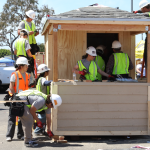
revolutionizing value exchange the growing impact of time banking across the globe
The well-known saying “time is money” has lately acquired a literal interpretation. Historically considered as an abstract idea, time is now being used as a kind of currency so that individuals may trade goods based on time instead of money. Often referred to as time banking, this creative approach lets communities trade assistance, skills, and services using a simple, charitable framework. Rooted in the spirit of mutual aid and volunteerism, time banking uses the power of giving and receiving inside a community to make service exchange available to all.
Rising Time Banking: Transposing an Age-Old Method Into a Contemporary System
Time banking has its roots in small acts of kindness amongst neighbors, where individuals frequently assisted one another without expecting pay-back. Usually done as a favor rather than a transaction, chores including yard work, meal preparation, or childcare were assigned. But modern technologies have made an organized form of this unofficial system possible. Easily available apps and digital time-tracking tools let people log and share time as actual money they may save, track, and “withdraw” as needed.
Time banking is founded on the idea that everyone’s time has equal value unlike conventional money. Whether someone spends an hour helping with house repairs or tutoring, the time given is equivalent and helps everyone to feel equal. This approach values everyone’s efforts equally, therefore strengthening community cohesion in addition to democratizing access to services.
Groundbreaking Time Bank Project in Switzerland for Senior Care
Leading worldwide in using time banking in useful applications is Switzerland. Responding to the difficulties presented by an aging population, the Swiss Ministry of Health created a novel Time Bank project targeted at elder care. This initiative invites people to donate their time to aid the elderly by means of daily chores, companioning, or errands completion. Every hour spent with or tending to an elderly person is credit entered into the volunteer’s own account.
The future-oriented attitude of this program is its genius. When volunteers themselves reach an age where they need such care, they can “withdraw” their banked hours, therefore guaranteeing a support system in place. The initiative creates a community of care and respect across generations, therefore lowering the pressure on state-supported elder care institutions and providing individuals with peace of mind knowing their efforts will be returned. It does more than just offer a service.
Related Posts
Time Banking Globally: the UK, Singapore, and Beyond
The attractiveness of time banking is growing globally; nations including the United Kingdom and Singapore are investigating or using such systems. Time banking projects have been accepted in the UK as a means of enhancing local communities, lower loneliness, and provide a substitute for expensive service fees. Time banking is also utilized in certain places to support public health campaigns by matching volunteers with people who might need assistance with everyday tasks, therefore relieving social service demand and promoting community support systems.
Time banking is attracting interest in Singapore as a possible element of their social security system. The country values a strategy that might improve community resilience and support between generations. Time banking offers a perfect means for Singapore, a nation that has long stressed social responsibility and communal well-being, to bring these ideals into useful application. These countries show the adaptability of time banking since each one of them customizes the approach to meet their particular social and cultural scene.
India’s Time Bank Model Interest
Understanding the possibilities of time banking, the National Human Rights Commission of India suggested implementing a time bank system starting in 2018. In a nation with a sizable older population and a strong family support system, the time bank concept is considered as a workable way to close gaps in elder care and encourage community assistance. Beyond elder care, India’s interest in time banking goes toward supporting a range of needs—from local public health services to education—by means of the system. The time bank model fits India’s past of community assistance really nicely and is ready to creatively handle changing social issues.
Time banking allows people to trade their time for services provided in their neighborhood, acting as a special barter system. Participants enter their hours in a digital time bank after providing a service—such as IT help, language instruction, or gardening—and pay basic fees. Every hour worked results in a credit that may subsequently be “withdrawn” to ask for services from other members.
The foundation of the model is generosity and reciprocity. Time banking values everyone’s time equally unlike conventional market systems whereby supply and demand define the worth of employment. This framework fosters equality and helps to create an environment in which abilities are valued for their use instead of their market worth. For communities, it encourages a cooperative attitude whereby people may help one another without regard to financial restrictions. From students and working professionals to retirees, this ease and inclusivity have made time banking a preferred alternative among many different groups.
Time banking has several benefits for people and groups both separately. Regardless of their financial situation, it provides an easily available means for people to get required services and grow in abilities. Time banking gives seniors company and assistance, therefore lowering their sense of isolation and ensuring they have tools for jobs they could find difficult. Time banking provides mentoring chances for younger members so they may acquire life skills or career direction.
Time banking also motivates community involvement. Time banks help to enhance social bonds, lower loneliness, and inspire people to actively support their communities by means of frequent encounters. Time banking reduces dependency on financial transactions and emphasizes resource-sharing inside local networks, therefore appealing to individuals looking for sustainable living as well.
Growing Potential of Time Banking: A View toward the Future
Time banking is poised to redefine social security, community support, even environmental sustainability as nations keep investigating this concept. Especially for underprivileged or financially limited populations, time banking has the potential to augment conventional economic systems in significant ways by letting people use their skills to meet one other’s needs.
Time banking presents interesting opportunities for improving physical and mental health as well. Studies reveal that by providing a feeling of purpose and belonging, community involvement and volunteering help to improve mental health. Time banking could provide a way for people to help the larger society as well as themselves in a society when loneliness and isolation are on increase.
Time banking is rapidly rising beyond a social experiment to be a dynamic movement with the ability to change communities all around the world, bridging gaps in healthcare, elder care, and everyday services. Time banking shows the continuing worth of time as a universal currency from Switzerland’s innovative project to growing interest in Asia. The simplicity and versatility of the system point to a future in which time really is valued as money and community wellbeing is the ultimate reward, therefore suggesting a solution for a wide spectrum of societies.









